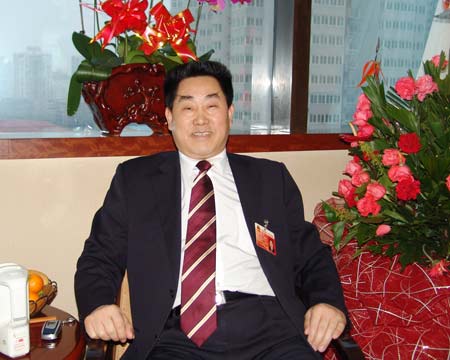| Tools: Save | Print | E-mail | Most Read |
| Henan Deputy: Agriculture Top Concern |
| Adjust font size: |
Agriculture is the foundation of China's national economy and social stability. As the biggest agricultural province in China, Henan views developing modern agriculture as the top priority in the process of building a new socialist countryside, Deputy Liu Mancang told china.org.cn on the sidelines of the Fifth Session of the Tenth National People's Congress (NPC).
Liu is a member of the Henan Delegation and the Communist Party secretary of Shangqiu City. "For agricultural development, we must strengthen government policy, funding, application of science and technology, and reform," he said. He disclosed that the central government will spend 391.7 billion yuan on agriculture, developing rural areas and the living conditions of farmers this year, an increase of 52 billion yuan from last year and 94.2 billion yuan from 2005. In the case of Henan, Liu said: "We are taking steps to ensure adequate irrigation for crops, so as to boost our crop yield. We are also looking into employing multiple-cropping patterns and greening methods." He pointed out that despite a number of serious natural disasters last year, China managed to maintain a rich grain harvest with total output amounting to 497.45 billion kilograms, 13.44 billion kilograms more than the year before. He attributed this stabilization to the twin effects of farmers' willingness to farm grain and the government's support policies, including the abolition of the millenium-old agriculture tax. Figures from National Bureau of Statistics showed that the per capita net income for the 900 million rural residents increased 7.4 percent to 3,587 yuan last year. Safe drinking water was made available to another 28.97 million rural people and the use of methane available to an additional 4.5 million rural families. "Solving the problems related to agriculture, rural area development and the living conditions of farmers is also very important, but it will be a long arduous task," he said, and went on to identify three important starting points: "First, while continuing to increase budgetary support, we need to make a very strong effort to solve financing problems in rural areas. "Second, we need to shift the focus of infrastructure development to rural areas to deal with pressing problems such as the need for more roads, methane facilities and water supplies. "Third, we must develop more social programs for the rural areas to resolve issues relating to access to proper medical care, education for children, and social security benefits." Citing Premier Wen Jiabao, Liu highlighted that agriculture is so important that "if something goes wrong with the economy in the future, it might occur in the agriculture sector, especially grain production. It is what the premier told us". "Therefore, we must seriously implement the policies of the central government to consolidate, improve and intensify support measures for agriculture and ensure the smooth operation of spring ploughing and sowing," he added. According to Liu's figures, things are looking on the up for Henan's farmers. Per capita consumption of farmers grew by 16.2 percent in 2006 compared with the previous year, indicating higher annual incomes, while that of their urban counterparts registered a year-on-year increase of 9.4 percent. This is the first time in the last 10 years that rural consumption growth has surpassed urban growth in the province. (China.org.cn by staff reporter Wang Ke, March 16, 2007) |
| Tools: Save | Print | E-mail | Most Read |
 |
| Related Stories |
|
Product Directory China Search |
Country Search Hot Buys |
